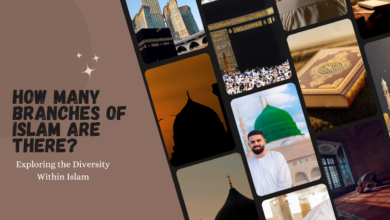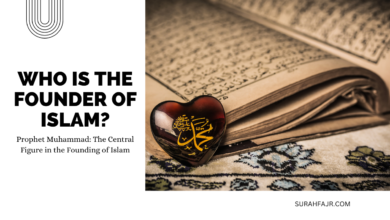
Why Islam?
Islam is a monotheistic Abrahamic religion founded in the 7th century CE by the Prophet Muhammad in the Arabian Peninsula. It is based on the belief in one God (Allah) and the guidance provided in the Quran, Islam’s holy scripture.

Introduction
Islam, one of the world’s major religions, holds a significant place in the hearts and minds of over 1.9 billion Muslims worldwide. Its rich history, deep-rooted traditions, and enduring influence on society make it a subject worthy of exploration and understanding. In this article, we delve into why Islam is a profound and influential faith, examining its core beliefs, historical contributions, cultural diversity, and global impact.
Core Beliefs of Islam
At the heart of Islam are the Five Pillars, which form the foundation of faith and practice for Muslims. These pillars encompass the declaration of faith (Shahada), prayer (Salat), almsgiving (Zakat), fasting during the month of Ramadan (Sawm), and pilgrimage to Mecca (Hajj). These practices guide the daily lives of Muslims, fostering a sense of unity, discipline, and devotion to God.
The central theological concept in Islam is the belief in one God, Allah, who is all-powerful, merciful, and compassionate. This monotheistic faith emphasizes personal accountability and the individual’s relationship with God, offering a profound sense of purpose and responsibility.
Historical Contributions
Islam’s historical contributions are vast and multifaceted, spanning various fields such as science, mathematics, medicine, philosophy, and architecture. During the Islamic Golden Age, which extended from the 8th to the 13th century, Muslim scholars made pioneering advancements in multiple disciplines, preserving and translating classical Greek and Roman texts while also contributing original works.
For instance, scholars like Al-Razi and Ibn Sina made groundbreaking contributions to medicine and pharmacology, laying the groundwork for modern healthcare practices. In mathematics, figures like Al-Khwarizmi played a crucial role in introducing algebra and algorithms, terms that bear his name. These historical achievements continue to influence the world today.
Cultural Diversity
Islam is a globally practiced religion with followers hailing from diverse cultures and backgrounds. The concept of the Ummah, or the global Muslim community, transcends national and ethnic boundaries. Muslims come from regions as diverse as North Africa, the Middle East, South Asia, Southeast Asia, Europe, and the Americas, enriching the faith’s tapestry with various traditions, languages, and customs.
This cultural diversity within Islam has given rise to a wide range of Islamic art, architecture, music, and literature. From the intricate geometric designs of Islamic architecture to the beautiful calligraphy in Quranic manuscripts, Islamic culture has left an indelible mark on the world’s artistic heritage.
Also Check
- Patience of prophet Muhammad (PBUH)
- What is Ashura Islam?
- What conditions were laid between the Muslims and the infidels on the occasion of peace at Hudaybiyah?
- Why was Hazrat Hussain martyred in Karbala?
- The Benefits of Islam
Global Impact
The global impact of Islam extends beyond the boundaries of faith. It has played a significant role in shaping the course of history, politics, and social movements. Islamic civilizations have had profound interactions with other cultures through trade, diplomacy, and intellectual exchanges, fostering a dynamic cross-cultural dialogue.
Furthermore, Islam has been a source of inspiration for countless individuals and movements striving for social justice, human rights, and peace. Figures like Mahatma Gandhi, who was influenced by Islamic principles of nonviolence, and Martin Luther King Jr., who admired the moral teachings of Islam, exemplify how the faith’s values have resonated with people worldwide.
Conclusion
In conclusion, the profound impact of Islam is evident in its core beliefs, historical contributions, cultural diversity, and global influence. It is a faith that has shaped the lives of billions, contributed to the advancement of human knowledge, and enriched the world with its diverse cultural expressions. Understanding the essence of Islam is not only a matter of religious interest but also a way to appreciate its enduring legacy in our interconnected world.

Frequently Asked Questions about Islam
What is Islam?
Islam is a monotheistic Abrahamic religion founded in the 7th century CE by the Prophet Muhammad in the Arabian Peninsula. It is based on the belief in one God (Allah) and the guidance provided in the Quran, Islam’s holy scripture.
Who is Allah in Islam?
Allah is the Arabic word for God in Islam. Muslims believe that Allah is the one and only God, who is all-powerful, all-knowing, and merciful. Allah has 99 names or attributes that describe His various qualities.
Who was the Prophet Muhammad, and what is his significance in Islam?
Prophet Muhammad is considered the final prophet in Islam. He is revered as the last messenger sent by Allah to guide humanity. His teachings and actions are recorded in the Quran and Hadith (sayings and actions of the Prophet), serving as a model for how Muslims should live their lives.
What is the Quran, and how is it significant to Islam?
The Quran is the holy scripture of Islam, believed to be the literal word of Allah as revealed to Prophet Muhammad. It serves as the primary source of guidance for Muslims, covering various aspects of life, including faith, morality, and law.
What are the Five Pillars of Islam?
The Five Pillars of Islam are the core acts of worship and practice that every Muslim is expected to uphold. They include the declaration of faith (Shahada), prayer (Salah), almsgiving (Zakat), fasting during Ramadan (Sawm), and pilgrimage to Mecca (Hajj).
What is the significance of prayer in Islam?
Prayer, or Salah, is a fundamental act of worship in Islam. Muslims are required to pray five times a day facing the Kaaba in Mecca. It is a means of establishing a direct connection with Allah, seeking guidance, and expressing gratitude.
What is Ramadan, and why do Muslims fast during this month?
Ramadan is the ninth month of the Islamic lunar calendar. Muslims fast from dawn to sunset during this month to commemorate the first revelation of the Quran to Prophet Muhammad. Fasting in Ramadan is a spiritual practice that fosters self-discipline, empathy for the less fortunate, and closeness to Allah.
What is the concept of Jihad in Islam?
Jihad is often misunderstood and misrepresented. In Islam, Jihad primarily means “struggle” or “striving.” It can refer to the personal struggle to become a better person, the effort to defend one’s faith, or the fight against injustice. It does not endorse violence against innocent people.
What is the role of women in Islam?
Islam affirms the dignity and rights of women. While cultural practices may vary, Islam grants women legal rights, the ability to work, and the right to education. Modesty in dress (hijab) is encouraged, but it is a choice for women to make.
What is the Islamic view on other religions?
Islam acknowledges the presence of other monotheistic faiths and teaches respect for the People of the Book, which includes Jews and Christians. Muslims are encouraged to engage in interfaith dialogue and promote peaceful coexistence.






